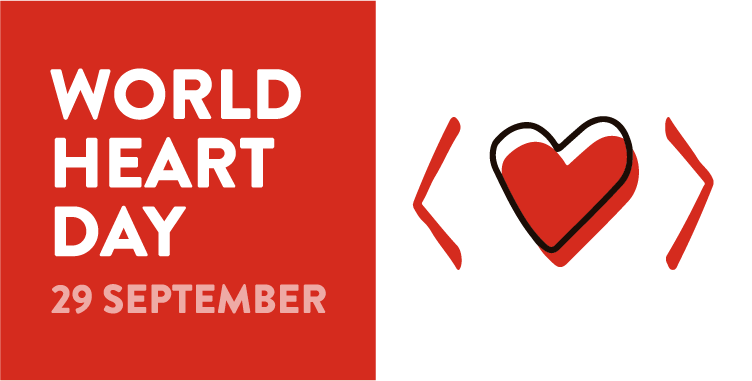World Heart Day Show Your Heart Some Love
577 viewsHeart Disease – A Global Killer
Our heart is the most vital and important organ of our body. It is the very reason our body functions and exists. The heart is responsible for processing oxygen and supplying blood to the rest of our body.
Although the heart is so critical to overall human health, millions of people still downplay the importance of cardiovascular or heart health. As a result heart disease or cardiovascular disease is a major factor in millions of deaths globally. According to the World Health Organization (WHO), 17.9 million people die every year as a result of heart disease.
Introduction
The human heart is a four-chambered double pump that is the centre of the human circulatory system (Encyclopaedia Britannica, 2019). It is situated between the two lungs and slightly to the left of centre, behind the breastbone; it rests on the diaphragm, the muscular partition between the chest and the abdominal cavity (Encyclopaedia Britannica, 2019).
Causes And Symptoms of Heart Disease
The WHO defines Cardiovascular diseases (CVDs) as “disorders of the heart and blood vessels. These include coronary heart disease, cerebrovascular disease, rheumatic heart disease and other conditions (WHO, 2019).” Heart disease is a non-communicable disease (NCD). The WHO reports that Cardiovascular diseases (CVDs) kill 17.9 million people every year. This means 31% of all global deaths are caused due to heart diseases. Heart diseases manifest themselves in the form of heart attacks and heart strokes, both extremely painful experiences which pose a serious risk to health and life. According to the WHO, the factors that lead to heart disease are:
- Tobacco use
- Unhealthy diet
- Physical inactivity
- Harmful use of alcohol
The symptoms that indicate the onset of heart disease in people are increased levels of blood pressure, blood glucose and weight gain leading to obesity. All these symptoms are the result of the above mentioned unhealthy habits and practices. These pose a serious threat to good heart health.
Preventive Measures and Precautions
According to the United States National Library of Medicine, there are certain risk factors in patients prone to heart diseases. These are:
- Age: The risk of heart disease increases as we continue to age.
- Gender: Men and women may be affected differently by heart disease factors. For example, The hormone estrogen provides women with some protection against heart disease. However, diabetes increases the risk of CVDs in women than in men.
- Race or Ethnicity: People belonging to particular racial and ethnic groups are more prone to heart diseases than others due to their genetics and lifestyle.
- Family history: You have a greater risk if you have a close family member who had heart disease at an early age.
The United States Library of Medicine also lists some simple ways to prevent heart diseases. Small changes to our lifestyles and diet can drastically reduce the risk of heart diseases. These can easily be understood and applied on a daily basis by every individual who is and isn’t at the risk of heart disease.
- Keep blood pressure under control
- Keep your cholesterol and triglyceride levels under control
- Have a healthy weight
- Eat a healthy and maintain a healthy diet
- Make exercise a regular routine
- Limit the intake of alcohol
- Limit or fully quit smoking
- Learn to manage stress better
- Keep diabetes in check
- Ensure you get adequate sleep
World Heart Day 2019 and its Significance
World Heart Day was originally created and observed by the World Heart Federation. World Heart Day aims to inform people around the globe about Cardiovascular Diseases through a collaborative and collective approach. World Heart Day is a global campaign that encourages people from all over to unite as individuals, families, communities, and urges governments around the world to participate in activities that educate about heart disease and ways to prevent it. The main message is of healthy eating and living and ultimately ensuring good heart health and longer life.
Having a healthy heart is crucial to overall good health which is a fundamental human right. Therefore, World Heart Day is an important day to address the challenges that hamper the achievement of good health and global health justice. We and our members believe in a world where heart health for everyone is a fundamental human right and a crucial element of global health justice.
Cardiovascular Disease (CVD) Prevention at the International Level
In 2015, the international community under the auspices of the United Nations adopted the Sustainable Development Goals to be achieved by 2030. Unlike the exclusion of non-communicable diseases such as heart disease from previous international agendas, the SDGs for 2030 include SDG 3: Ensure healthy lives and promote well-being for all at all ages. Furthermore, its sub clause 3.4. States:
“By 2030, reduce by one-third premature mortality from non-communicable diseases through prevention and treatment and promote mental health and wellbeing” (United Nations, 2015).
In addition, platforms such as the World Heart Federation and WHO are also committed to fighting CVDs. In September 2016, the WHO launched the Global Hearts Initiative. Since then several countries have imbibed the initiative. Under this initiative, “health workers are being trained to better deliver tested and affordable measures to protect people from CVDs and help them to recover following a heart attack or stroke( WHO, 2019).”
Under the Global Hearts Initiative, three technical packages are intended to help meet these goals:
- MPOWER for tobacco control
- SHAKE for salt reduction
- HEARTS for the strengthening of CVD management in primary health care.
The WHO’s new global initiative by the name of Resolve to Save Lives will act as an impetus to these efforts (WHO, 2019).
Hopefully, this World Heart Day, the efforts from the individual to the international level to spread awareness about CVDs bear fruit.

